Papers by Amelie Constant
RePEc: Research Papers in Economics, Dec 1, 2006
Ethnic Persistence, Assimilation and Risk Proclivity * The paper investigates the role of social ... more Ethnic Persistence, Assimilation and Risk Proclivity * The paper investigates the role of social norms as a determinant of individual attitudes by analyzing risk proclivity reported by immigrants and natives in a unique representative German survey. We employ factor analysis to construct measures of immigrants' ethnic persistence and assimilation. The estimated effect of these measures on risk proclivity suggests that adaptation to the attitudes of the majority population closes the immigrantnative gap in risk proclivity, while stronger commitment to the home country preserves it. As risk attitudes are behaviorally relevant, and vary by ethnic origin, our results could also help explain differences in economic assimilation of immigrants.
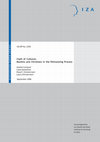
Social Science Research Network, 2006
Clash of Cultures: Muslims and Christians in the Ethnosizing Process * The paper explores the evo... more Clash of Cultures: Muslims and Christians in the Ethnosizing Process * The paper explores the evolution of ethnic identities of two important and distinct immigrant religious groups. Using data from Germany, a large European country with many immigrants, we study the adaptation processes of Muslims and Christians. Individual data on language, culture, societal interactions, history of migration and ethnic self-identification are used to compose linear measures of the process of cultural adaptation. Two-dimensional variants measure integration, assimilation, separation and marginalization. Christians adapt more easily to the German society than Muslims. Immigrants with schooling in the home country and with older age at entry as well as female Muslims remain stronger attached to the country of origin. Female Muslims integrate and assimilate less and separate more than Muslim men, while there is no difference between male and female Christians. Christians who were young at entry are best integrated or assimilated, exhibiting lower separation and marginalization in the later years, while for Muslims a similar pattern is observed only for assimilation and separation. Christian immigrants with college or higher education in the home country integrate well, but Muslims do not. For both religious groups, school education in the home country leads to slower assimilation and causes more separation than no education at home. While school education has no impact on integration efforts for Muslim, it affects similar attempts of Christians negatively.
Social Science Research Network, 2007
This paper investigates whether immigrants adapt to the attitudes of the majority population in t... more This paper investigates whether immigrants adapt to the attitudes of the majority population in the host country by focusing on the effect of ethnic persistence and assimilation on individual risk proclivity. Employing information from a unique representative German survey, we find that adaptation to the host country closes the existing immigrant-native gap in risk proclivity by reducing immigrants' risk aversion and explains the systematic variation in the observed risk attitudes across immigrants of different origins. Our analysis of the adaptation behavior of immigrants suggests that acquisition of social norms is an essential factor in the formation of individual attitudes.
RePEc: Research Papers in Economics, Dec 1, 2006
The Russian-Ukrainian Political Divide * The Orange Revolution unveiled significant political and... more The Russian-Ukrainian Political Divide * The Orange Revolution unveiled significant political and economic tensions between ethnic Russians and Ukrainians in Ukraine. Whether this divide was caused by purely ethnic differences or by ethnically segregated reform preferences is unknown. Analysis using unique micro data collected prior to the revolution finds that voting preferences for the forces of the forthcoming Orange Revolution were strongly driven by preferences for political and economic reforms, but were also independently significantly affected by ethnicity; namely language and nationality. Russian speakers, as opposed to Ukrainian speakers, were significantly less likely to vote for the Orange Revolution, and nationality had similar effects.
Applied Economics Letters, Oct 25, 2016
This paper analyzes the reservation wages of first and second generation migrants. Based on recen... more This paper analyzes the reservation wages of first and second generation migrants. Based on recently collected and rich survey data of a representative inflow sample into unemployment in Germany, we empirically test the hypothesis that reservation wages increase from first to second generation migrants. Two extensions of the basic job search model, namely an unknown wage offer distribution and different reference standards, provide theoretical justifications for this conjecture. In both extensions, changing frames of reference are identified as a channel through which the phenomenon of increasing reservation wages may arise. In as far as language skills or self-evaluated returns to characteristics reflect a person's frames of reference, we find empirical support for this mechanism to be present.
Revue d'économie financière, 2017
This paper examines the migration and labor mobility in the European Union and elaborates on thei... more This paper examines the migration and labor mobility in the European Union and elaborates on their importance for the existence of the EU. Against all measures of success, the current public debate seems to suggest that the political consensus that migration is beneficial is broken. This comes with a crisis of European institutions in general. Migration and labor mobility have not been at the origin of the perceived cultural shift. The EU in its current form and ambition could perfectly survive or collapse even if it solves its migration challenge. But it will most likely collapse, if it fails to solve the mobility issue by not preserving free internal labor mobility and not establishing a joint external migration policy. Classification JEL: D01, D02, D61, F02, F16, F22, F66, J60.
Mapping Diasporas in the European Union and United States: Comparative Analysis and Recommendations for Engagement, 2014
Report prepared in collaboration with RAND Europe for the European Commission, Bonn 2014 (350 pag... more Report prepared in collaboration with RAND Europe for the European Commission, Bonn 2014 (350 pages) [view online appendix]
Research in Labor Economics, 2009
Population Economics, 2004
Softcover reprint of the hardcover 1st edition 2004 The use of general descriptive names, registe... more Softcover reprint of the hardcover 1st edition 2004 The use of general descriptive names, registered names, trademarks, etc. in this publication does not imply, even in the absence of a specific statement, that such names are exempt from the relevant protective laws and regulations and therefore free for general use.
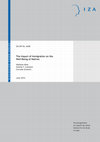
The Impact of Immigration on the Well-Being of Natives * This paper examines the effect of immigr... more The Impact of Immigration on the Well-Being of Natives * This paper examines the effect of immigration directly on the overall utility of natives. To the best of our knowledge, this is the first paper to explore such nexus. Combining information from the German SocioEconomic Panel dataset with detailed local labour market characteristics for the period 1997 to 2007, we investigate how changes in the spatial concentration of immigrants affect the subjective well-being of the German-born population. Our results suggest the existence of a robust, positive effect of immigration on natives' wellbeing. The presence of confounding local labour market characteristics has a negligible impact on the estimates. Furthermore, we find substantial evidence that the effect of immigration on well-being is a function of the assimilation of immigrants in the region. The effect of immigration is higher in regions with an intermediate level of economic assimilation and is essentially zero in areas where immigrants are either least or fully economically integrated. We conduct robustness checks to address the potential endogeneity between subjective well-being and immigration. Our tests indicate that natives are not crowded out by immigrants, and that the sorting of immigrants to regions with higher SWB is weak. This suggests that our main findings are not driven or strongly influenced by reverse causality or selectivity.
This paper investigates the sorting of individuals into full-time paid-employment and entrepreneu... more This paper investigates the sorting of individuals into full-time paid-employment and entrepreneurship and their earnings. Particular attention is paid to the role of legal status at entry in the host country (worker, refugee, and family reunification). For Germany, legal status at entry is important; former refugees and those migrants who arrive through family reunification are less likely to work full-time; refugees are also less self-employed. Those who came through the employment channel are more likely to be in full-time paid work. In Denmark, however, the status at entry variables do not play any significant role. JEL classification: J15, J23, J61
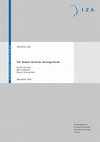
Any opinions expressed here are those of the author(s) and not those of the institute. Research d... more Any opinions expressed here are those of the author(s) and not those of the institute. Research disseminated by IZA may include views on policy, but the institute itself takes no institutional policy positions. The Institute for the Study of Labor (IZA) in Bonn is a local and virtual international research center and a place of communication between science, politics and business. IZA is an independent nonprofit company supported by Deutsche Post World Net. The center is associated with the University of Bonn and offers a stimulating research environment through its research networks, research support, and visitors and doctoral programs. IZA engages in (i) original and internationally competitive research in all fields of labor economics, (ii) development of policy concepts, and (iii) dissemination of research results and concepts to the interested public. IZA Discussion Papers often represent preliminary work and are circulated to encourage discussion. Citation of such a paper shou...
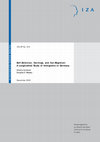
This Discussion Paper is issued within the framework of IZA’s research area Mobility and Flexibil... more This Discussion Paper is issued within the framework of IZA’s research area Mobility and Flexibility of Labor. Any opinions expressed here are those of the author(s) and not those of the institute. Research disseminated by IZA may include views on policy, but the institute itself takes no institutional policy positions. The Institute for the Study of Labor (IZA) in Bonn is a local and virtual international research center and a place of communication between science, politics and business. IZA is an independent, nonprofit limited liability company (Gesellschaft mit beschränkter Haftung) supported by the Deutsche Post AG. The center is associated with the University of Bonn and offers a stimulating research environment through its research networks, research support, and visitors and doctoral programs. IZA engages in (i) original and internationally competitive research in all fields of labor economics, (ii) development of policy concepts, and (iii) dissemination of research results ...
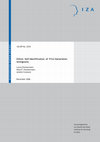
Any opinions expressed here are those of the author(s) and not those of the institute. Research d... more Any opinions expressed here are those of the author(s) and not those of the institute. Research disseminated by IZA may include views on policy, but the institute itself takes no institutional policy positions. The Institute for the Study of Labor (IZA) in Bonn is a local and virtual international research center and a place of communication between science, politics and business. IZA is an independent nonprofit company supported by Deutsche Post World Net. The center is associated with the University of Bonn and offers a stimulating research environment through its research networks, research support, and visitors and doctoral programs. IZA engages in (i) original and internationally competitive research in all fields of labor economics, (ii) development of policy concepts, and (iii) dissemination of research results and concepts to the interested public. IZA Discussion Papers often represent preliminary work and are circulated to encourage discussion. Citation of such a paper shou...
This paper examines the migration and labor mobility in the European Union and elaborates on thei... more This paper examines the migration and labor mobility in the European Union and elaborates on their importance for the existence of the EU. Against all measures of success, the current public debate seems to suggest that the political consensus that migration is beneficial is broken. This comes with a crisis of European institutions in general. Migration and labor mobility have not been at the origin of the perceived cultural shift. The EU in its current form and ambition could perfectly survive or collapse even if it solves its migration challenge. But it will most likely collapse, if it fails to solve the mobility issue by not preserving free internal labor mobility and not establishing a joint external migration policy.
Footprints of Regional Science, 2020

and IZA) have assembled an impressive collection of articles offering broad coverage of an import... more and IZA) have assembled an impressive collection of articles offering broad coverage of an important and timely topic. As the first comprehensive collection of this sort, the Handbook fills a considerable gap in the literature. Further, the editors should be commended for assembling a group of highly regarded contributors. The editors' Introduction is followed by 28 chapters grouped into four broad categories: The Move, Performance and the Labor Market, New Lines of Research, and Policy Issues. The Move begins with two chapters that examine the determinants of migrationone by John Keenan and James Walker and one by Constant, Olga Nottmeyer, and Zimmermann. Beginning with a discussion of what causes migration is certainly appropriate. The final three chapters of the initial section demonstrate both the breadth of coverage provided by the Handbook, and the reach of migration into related fields. Michel Grignon, Yaw Owasu, and Arthur Sweetman examine healthcare worker shortages in developed countries and the migration from developing countries of workers trained in health-related fields. The authors then discuss the public policy implications for source and destination countries. This is followed by an insightful contribution on child labor by Eric Edmonds and Maheshwor Shrestha. These authors provide an excellent overview of major research needs in terms of the measurements, causes, and consequences of child labor migration. Guido Friebel and Sergei Guriev conclude the first section with a compelling article on human smuggling. The initial chapters of the second part of the book focus on familiar research themes while latter chapters introduce newer topics. Martin Kahanec shows that migration following EU enlargements has benefited the source countries through greater "brain circulation" and that destination countries have gained from increased productivity and output. Thus, migration has not adversely affected wages in the destination countries; there appears to be limited, if any, empirical support for the notion that migration encumbers the welfare systems of destination countries. Robert Fairlie shows that immigrant-owned startup firms are typically better capitalized than firms started by native-born entrepreneurs. The reason for this is that immigrants rely on personal and family savings, rather than capital markets, for funding. Matloob Piracha and Florin Vadean begin with a strong literature review on educational mismatches between immigrants and destination country labor markets. The authors show that immigrants are more likely to be over-educated as compared to members of the nativeborn population. Furthering the theme of a mismatch, David Neumark explores spatial mismatch as one of three principle influences, along with discrimination and access to networks, in the hiring of minority workers. Logically placed, following the discussion of
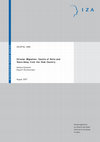
Any opinions expressed here are those of the author(s) and not those of the institute. Research d... more Any opinions expressed here are those of the author(s) and not those of the institute. Research disseminated by IZA may include views on policy, but the institute itself takes no institutional policy positions. The Institute for the Study of Labor (IZA) in Bonn is a local and virtual international research center and a place of communication between science, politics and business. IZA is an independent nonprofit company supported by Deutsche Post World Net. The center is associated with the University of Bonn and offers a stimulating research environment through its research networks, research support, and visitors and doctoral programs. IZA engages in (i) original and internationally competitive research in all fields of labor economics, (ii) development of policy concepts, and (iii) dissemination of research results and concepts to the interested public. IZA Discussion Papers often represent preliminary work and are circulated to encourage discussion. Citation of such a paper shou...






Uploads
Papers by Amelie Constant